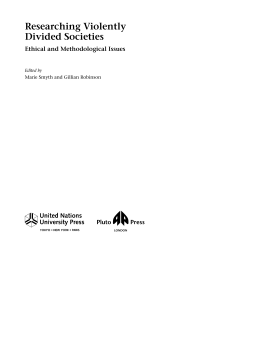
Additional Information
Book Details
Abstract
All societies are, to a certain extent, divided by conflicts over race, ethnicity, religion and class. However, in societies such as Britain and the United States these tensions are contained and managed by social, economic and political mechanisms.
This book, produced as a result of an international collaboration between researchers in Eastern Europe, Africa, the Middle East, Northern Ireland and elsewhere aims to:
* Provide a guide to the issues faced by researchers working in violently divided contexts;
* Document the insights and practice wisdom of practising researchers operating in such contexts;
* Afford access to the lived experience of those researchers and the ethical and methodological challenges which face them;
* Present accounts and analysis which illustrate a wide range of diverse experiences and perspectives on the experience of doing research in violently divided societies;
* Explore the involvement of the researchers with the research material and the impact of doing the research on them.
A range of ethical and methodological issues are covered, and the specific demands of conducting research in war-torn and divided societies has stimulated the contributors to analyse and critique issues such as the contribution of research to society, the benefit of research to respondents, and issues of objectivity – issues of concern to all researchers. However, in the often stark circumstances in which the contributors work, these issues take on an urgency and clarity that can potentially illuminate research practice generally.
The book deals with the methodological and ethical issues arising when researching conflicts in violently divided societies where there is no consensus about policing, law and order, the impartiality of the state or indeed about the legitimacy of the state itself. With contributions from researchers who have worked in a range of very different divided societies around the world, it examines the conditions under which such inquiry is conducted and looks at the obstacles that researchers face. Researching Violently Divided Societies looks in detail at different case studies to offer a sound understanding of the most effective methodological approaches for improving responses to division and violence.
Chapters cover the role and function of research in divided societies in Africa; the efficacy of research in Northern Ireland; dilemmas of identification and ethnography; research by insiders and outsiders; research for empowerment in Cambodia; the role of research in managing conflicts in Nigeria; researching ethnic conflict in Post-Soviet central Asia; a first-time researcher's experience in Bosnia; the ethics of psychiatric research in war zones; and a final comparison of policy.
Table of Contents
| Section Title | Page | Action | Price |
|---|---|---|---|
| Contents | v | ||
| Institutional Background | vii | ||
| Introduction | 1 | ||
| 1 The Role and Function of Research in Divided Societies: The Case of Africa | 12 | ||
| Notes and References | 30 | ||
| 2 Does Research Make Any Difference? The Case of Northern Ireland | 34 | ||
| Notes and References | 52 | ||
| 3 Reflexivity and the Dilemmas of Identification: An Ethnographic Encounter in Northern Ireland | 55 | ||
| Notes and References | 72 | ||
| 4 The Impermeable Identity Wall: The Study of Violent Conflicts by Insiders and Outsiders | 77 | ||
| Notes and References | 91 | ||
| 5 Research for Empowerment in a Divided Cambodia | 92 | ||
| Notes and References | 104 | ||
| 6 The Role and Process of Action Research in the Management of Violent Community Conflicts in Nigeria | 106 | ||
| References | 127 | ||
| 7 Researching Ethnic Conflict in Post- Soviet Central Asia | 130 | ||
| Notes and References | 146 | ||
| 8 The Use of Epidemiological Methods in Assessing the Impact of War and Armed Conflict | 148 | ||
| References | 163 | ||
| 9 A Field Trip to Bosnia: The Dilemmas of the First- Time Researcher | 165 | ||
| Notes and References | 181 | ||
| 10 The Ethics of Conducting Psychiatric Research in War-Torn Contexts | 184 | ||
| References | 190 | ||
| 11 One Size Fits All? Focused Comparison and Policy-Relevant Research on Violently Divided Societies | 193 | ||
| Conclusions | 207 | ||
| Notes on Contributors | 210 | ||
| Index | 215 | ||
| AAPW [Nigeria] | 108 | ||
| 108 -10 | 108 | ||
| community-based, 110 -11 | 110 | ||
| teaching of, 127 | 127 | ||
| to understand conflict, 115 -18 | 115 | ||
| Aboutanos, M.B. and Baker, S.P., 158 | 158 | ||
| Academic Associates Peace Works [AAPW] | 124 | ||
| intervention mechanisms, 124 -7 | 124 | ||
| project in Nigeria, 107 -10 | 107 | ||
| research reports, 123 | 123 | ||
| research reports, 124 | 124 | ||
| access | 140 | ||
| to information [Central Asia], 140 -1 | 140 | ||
| for researchers [Bosnia], 167 -8 | 167 | ||
| to 'other ' side, , 84 -5 | 84 | ||
| to literacy, 207 | 207 | ||
| to public officials, 84 | 84 | ||
| access to official information | 83 | ||
| 83 -4 | 83 | ||
| Central Asia, 135 -6 | 135 | ||
| Central Asia, 138 -41 | 138 | ||
| ACCORD [African Centre for the Constructive Resolution of Disputes] 30 n | 30 | ||
| accountability; analytical | 70 | ||
| analytical 70 -1 | 70 |
